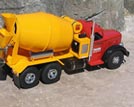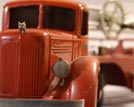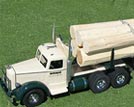ABOUT US
It was the spring of 1979. Smith-Miller, Incorporated, which had made trucks of about 1/16 scale under that name as well as "Smitty Toys" and "M.I.C." (derived from Miller-Ironson Corporation), had been defunct for about 23 years. Each day the current owner of the remains of the company assets would walk through what had been the Smith-Miller plant in Los Angeles to an area at the rear of the building. There he operated a separate and different type of business. He probably did so without realizing or caring that the work benches, boxes, barrels, crates and even rafters contained toy trucks and parts sought by hundreds of persons around the country. There was an occasional inquiry about the defunct company, probably not enough to indicate how collectible Smith-Miller trucks were or might become. However, there was one local resident that seemed to show considerable interest, especially in getting needed parts for trucks he owned.
Fred Thompson, a Los Angeles area resident, had bought Smith-Miller trucks as a kid. He still had several and needed parts to restore them. Unlike today, original or replacement parts for Smith-Miller trucks were not available. Not to be deterred, Fred called information in Santa Monica where he thought the company had last been located but with no luck. For some reason that he cannot explain or remember, a few weeks later he called Los Angeles information. After considerable time spent by an unusually cooperative operator, she found a listing for Smith-Miller, Incorporated in the white pages. The owner had maintained a phone for the inoperative company. Fred had located the former Smith-Miller factory!
After several calls for an appointment, Fred was finally able to get into the factory. The factory was easy to spot, because the sign still hung over the door. Thereafter, he made recurring trips to obtain parts for his trucks. On occasion, he would express to the owner an interest in obtaining the remnants of the company.
In the spring of 1979, a "toy deal" unlike few that had preceded or have followed was being concluded. Fred Thompson, the heretofore restorer of Smith-Miller trucks who had found the former company four years earlier, was going to buy it! Not just the leftover trucks... not just the parts... the whole company! The cardboard boxes... the sign over the door... the factory photos... the dies... the company name... the whole company!
Smith-Miller, Incorporated, former producer of arguably the finest toy trucks ever made in the United States or anywhere else, now had a new chief executive officer, owner and employee. This might sound great and even overwhelming; it was overwhelming for several reasons. Fred was faced with a manufacturing plant that looked as it had the day it ceased operations except for the layers of dust and dirt on everything. Work benches contained toy trucks in various stages of assembly. Nearby were the parts needed to complete the trucks in process, and elsewhere were quantities of parts from formerly produced trucks. All of this stuff, literally tons of it, had to be moved, inventoried and stored. The deal did not include the building.
What became the stock, materials inventory and tooling for the resurrected Smith-Miller Corporation was moved to several locations with reasonable attempts to inventory the holdings. While plans for the future were being considered, the lure of immediate profits by reselling his acquisition was dismissed by the new owner. Interested buyers seemed likely to use the assets to reproduce formerly issued Smith-Miller trucks. That prospect did not appeal to the toy collector instincts in Fred. As a result, to date no Smith-Miller trucks have been reproduced or reissued. Rumors to the contrary still persist but are simply not true.
Fred Thompson decided that two courses of action would best benefit the company and Smith-Miller truck collectors alike. These were to first sell the Smith-Miller trucks in production and in stock and then to make new trucks of at least equal quality that had never before been produced.
When the company ceased production in the mid-1950's, two models of trucks were in production. These were the #21 Fire Truck (of MIC style) and the yellow GMC Coke truck. The paint and decals had been applied many years ago; the trucks simply needed to be assembled. Here one of Fred's first production problems arose. The twenty-some year old tires had hardened to the point that mounting them on wheels had become nearly impossible. To remedy this situation, Fred had the original maker produce new tires using the original compound from the original molds. This problem was overcome; the trucks were assembled from the remaining parts on hand; and original boxes were folded and secured to hold the new-old-stock trucks to be sold. (The only known way, to my knowledge, of differentiating between one of the factory leftover trucks and former production ones is by the tires. It really doesn't matter anyway.)
As Fred was moving his newly acquired corporate assets, he discovered a modest quantity of previously produced trucks. Most of these had not been sold, probably because they had not passed final inspection for reasons that would not exclude them from collections today. For example, I obtained an otherwise mint example of an M.I.C. lumber truck with one problem. There was a scratch in the paint on the right fender about one half inch long; it appeared to have been caused by a headlight that slipped during assembly. A second example was a B Mack P.I.E. that was found in the rafters. This truck was sold to a collector in the East and immediately returned because it had an extra spot weld in the trailer roof and bulldog hood ornament. I subsequently purchased the truck and later had the opportunity to thank the wary first purchaser. (No, none of these trucks remain, zero. Don't call or write, at least not in an attempt to score one of these old stock trucks. They are all gone.)
The second course of action was to make new Smith-Miller trucks. The new trucks had to be at least of equal quality and ones that might have been formerly made had production not ceased. In regard to quality, keep in mind that Smith-Miller made toy trucks, not collectibles or models. Minor flaws were not unusual on the original trucks. As examples, LF Mack cabs almost always show file marks, and most show results on the hoods and grills of deteriorating dies. Crooked and missing decals are not unusual, and the paint may sometimes contain a run or a thin spot.
Fred Thompson and the Smith-Miller Corporation of today have produced 48 different toy trucks. These newer trucks have all been serially numbered limited edition issues. They are made from new-old-stock parts, replacement parts made form original dies and/or to original specifications and newly manufactured parts, which are made to exacting standards. The trucks are hand assembled and packed and shipped in the best and probably most secure packaging available.
The approximate year of issue (approximate because Fred was not absolutely certain for some of the trucks) and descriptive information for the limited edition trucks thus far produced.
Smith-Miller Trucks



- ';
foreach($categoriesData as $k=>$v) {
echo '
- '.$v['title'].' '; } echo '